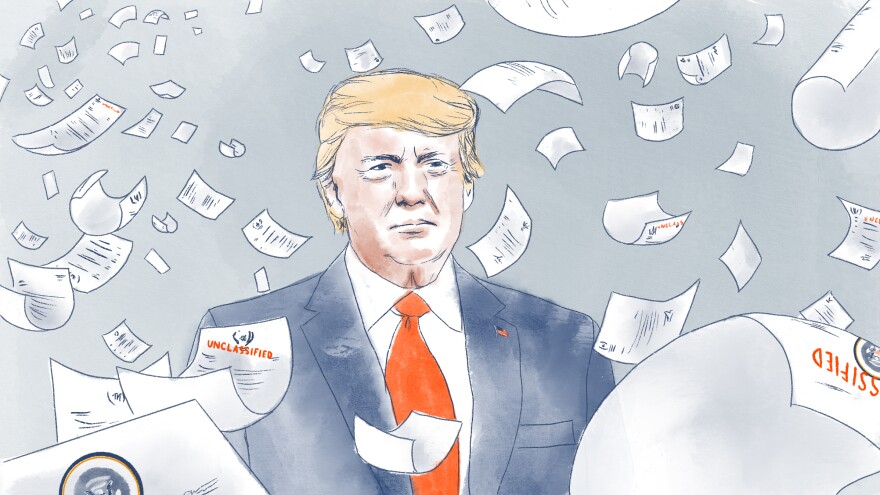Updated on Jan. 20 at 11:15 p.m. ET
The Senate has begun a trial on whether or not to remove President Trump from office, over a month after the House voted to impeach him. A group of House Democrats, called impeachment managers, are arguing the case for convicting the president and removing him from office. Trump's legal defense team includes White House counsel Pat Cipollone and personal lawyer Jay Sekulow.
Read the latest news about the inquiry; listen to our special broadcast coverage.
While momentum toward impeachment had been building among Democrats for months, House Speaker Nancy Pelosi, D-Calif., announced an inquiry in September — after a whistleblower complaint about a White House phone call with Ukraine.
In a call with Ukrainian President Volodymyr Zelenskiy on July 25, Trump asked for an investigation into a debunked conspiracy theory about the 2016 election and into potential 2020 rival and former Vice President Joe Biden. The White House is also accused of withholding military aid to Ukraine for Trump's personal political gain. Trump maintains that he has done nothing wrong.
The House conducted an inquiry that involved a series of closed-door depositions followed by open hearings with key witnesses, including career diplomats with expertise in Ukraine policy. The House Judiciary Committee then voted to recommend impeachment, and the full House voted to impeach on Dec. 18.
The Senate trial began in earnest on Jan. 21, with a vote on the ground rules. Each side then had 24 hours over three days for opening arguments. A period of questioning and then debate over witnesses follows the arguments. At the end of the trial, the Senate will vote on whether to remove Trump from office or acquit him.
The Articles

The House brought two articles of impeachment against Trump: abuse of power and obstruction of Congress.
"President Trump has acted in a manner contrary to his trust as President and subversive of constitutional government, to the great prejudice of the cause of law and justice, and to the manifest injury of the people of the United States," the resolution reads.
The Trial

Following the House vote to impeach, the Senate holds a trial. Republican and Democratic leadership have been fighting over what constitutes a "fair" trial and whether that includes witnesses who did not take part in the House's investigation.
In the trial, members of the House serve as "managers" who make the case for Trump's removal. The president has his own defense team, including White House counsel, outside attorneys and Republican members of the House.
After the proceedings, senators vote on whether to remove or acquit Trump, based on each article.
Read more about the trial process.
Who Was On The Call
The White House has not released a full list of participants on the July 25 call, but NPR has compiled a list of people identified so far. Here's who they are.
Timeline: The Ukraine Affair

From Trump's early focus on Ukraine in 2017, to the release of the whistleblower complaint on Sept. 26, here's how we got to the impeachment inquiry.
Separately, here is a full timeline of the impeachment inquiry, including these key dates:
Dec. 11: House Judiciary begins debate on articles
Dec. 13: House Judiciary approves articles of impeachment
Dec. 18: Full House debates the articles and then votes to impeach
Jan. 16: House impeachment managers hand-deliver the articles to the Senate, a day after being appointed. U.S. Chief Justice John Roberts and senators are sworn in.
Jan. 21: Opening arguments begin in the Senate trial.
Who And What: Key People And Concepts

Since the original whistleblower complaint was released, the list of names of those connected to Trump's call with Zelenskiy or to broader Ukraine policy has grown substantially.
From the president to career diplomats to private lawyers, here is a quick guide to people connected to the events being investigated.
Loading...
In-depth profiles and features:
Documents: Primary Sources
Written words are central to the Ukraine affair. The significance of the whistleblower's original complaint and the White House's record of its call with Ukraine are debated, but the text is public. Here are the documents to refer to as the inquiry proceeds:
Texts and memos
Corroborating the whistleblower complaint
The whistleblower's complaint has largely been corroborated by witness testimony, public statements and media reports. Read an annotation of the document.
Transcripts of closed-door depositions
Public hearings

Nov. 13: William Taylor, George Kent
Taylor Says Trump Asked About Ukraine 'Investigations'
Nov. 15: Marie Yovanovitch
Yovanovitch Says Trump Comments In July Call Felt Like A 'Threat'
Nov. 19: Jennifer Williams, Alexander Vindman, Kurt Volker, Tim Morrison
Impeachment Witness Testifies That Trump's Ukraine Call Was 'Improper'
Nov. 20: Gordon Sondland, Laura Cooper, David Hale
Sondland Says Top Trump Officials Knew Of Push For Ukraine Investigations
Nov. 21: Fiona Hill, David Holmes
Impeachment Hearings Wrap As Fiona Hill Slams GOP's 'Fictional' Ukraine Account
Dec. 4: House Judiciary hearing on impeachment and the Constitution
Judiciary Committee Takes Up Impeachment In Hearing With Legal Scholars
Dec. 9: Presentation of the evidence for impeachment to Judiciary
Democrats Argue Trump Actions Are 'Clear And Present Danger'
Special Coverage
NPR is airing special coverage at pivotal moments in the inquiry to help you make sense of it all. Listen to those broadcasts on your local public radio station. Find the archive of the audio here.
Copyright 2023 NPR. To see more, visit https://www.npr.org.



